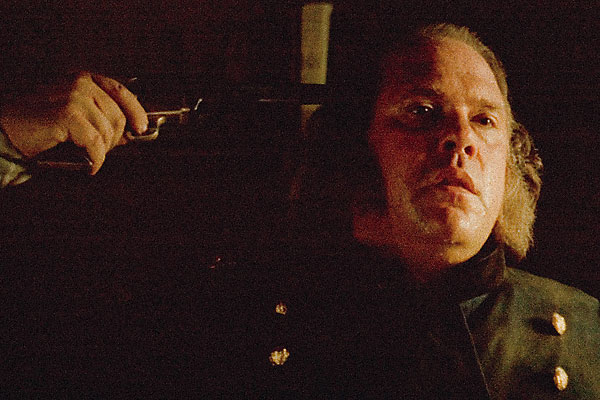
Who knows the number of times that pioneers, cowboys, military men and others in the Old West suffered from afflictions of one sort or another that were untreatable for various reasons?
A tragedy, not uncommon in the Old West, occurred when both the availability and the advancements in medical or surgical care were absent. With intolerable suffering, an afflicted person probably searched in vain for treatment, hung on until the bitter end or even took his own life.
The most interesting cinematic depiction of this problem occurred in the Kevin Costner epic Dances With Wolves (1990). Recall that Costner (as the character Lt. John J. Dunbar) had been deemed a hero after his unsuccessful, battlefield suicide attempt during the Civil War. He was posted, by his own request, to remote Fort Hayes on the Kansas/Colorado frontier. After a journey by horseback and before leaving for his abandoned military post, he presented his orders to his commanding officer, Maj. Fambrough (Maury Chaykin). Acting in a quixotic, bizarre manner, while dismissing Dunbar, Fambrough stood up and uttered the desperate lines, “Sir Knight, I’ve just pissed my pants, and nobody can do anything about it!” Within minutes, while Dunbar was leaving the fort, Fambrough walked to the window of his office and blew his brains out.
The reason for this behavior requires the establishment of a differential diagnosis, the pillar of any good medical investigation. I have very little information about this man, but I will assume that Fambrough had been struggling with this problem for some time. I will also assume that Fambrough was afflicted with an uncontrollable loss of urine that is known medically as urinary incontinence.
There are four general classifications of urinary incontinence. Their causes are numerous but can be generally related to neurological and/or mechanical lesions, tumors or even psychological factors, including dementia.
One type is called “stress incontinence” that may occur when the muscles in the abdomen are stressed, such as during laughing, coughing or sneezing. Another is “urge incontinence,” an uncontrollable loss of urine that may be preceded by an uncontrollable urge to urinate. A third type is “overflow incontinence” that may occur when the bladder is chronically distended and any incremental production of urine is accompanied by loss of urine through the urethra (the tube from the bladder to the outside world). The fourth and worst malady is called “total incontinence,” in which urine is lost at all times.
Fambrough’s differential diagnosis is extensive and could include a benignly enlarged or inflamed prostate or a bladder, spinal cord or prostate tumor that had infiltrated critical nerves that control urination. He may have had bladder stones that caused a mechanical intermittent obstruction of urine flow. He was a military man and could have sustained a direct injury to his urinary tract with the development of a fistula (a tube that bypasses the urethra) causing constant dribbling of urine. He may have had a brain tumor, Multiple Sclerosis (MS) or even Parkinson’s Disease, all of which have the capacity to cause dementia and to disrupt volitional and inhibitory nerve signals to the bladder, thus causing involuntary loss of urine. Interestingly, one must also consider that his primary incontinence may have driven him to his secondary psychotic behavior.
Fambrough is an interesting character about whom to speculate. He appears to be in his mid-40s to early 50s. He was able to stand up and walk to the window, somewhat ruling out a major spinal cord lesion. Given his cinematic presentation, including his delusional behavior, I think that his most probable diagnosis is that he had a brain tumor with progressive dementia that destroyed his ability to control his urine flow. Prostate disease, including cancer with spread to the brain, would also be high on the list.
In a remote outpost, hundreds of miles from the evolving, although limited, medical care of the day, this man’s hopelessness was well depicted by Fambrough and directed by Costner. Regrettably, even today, this scenario may be replayed for too many afflictions, even when medical care is a 911 call away.






